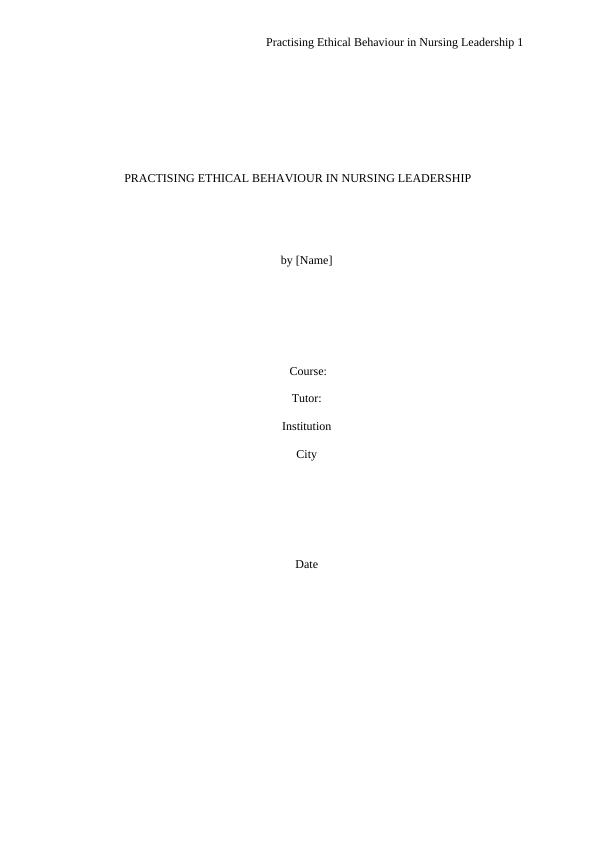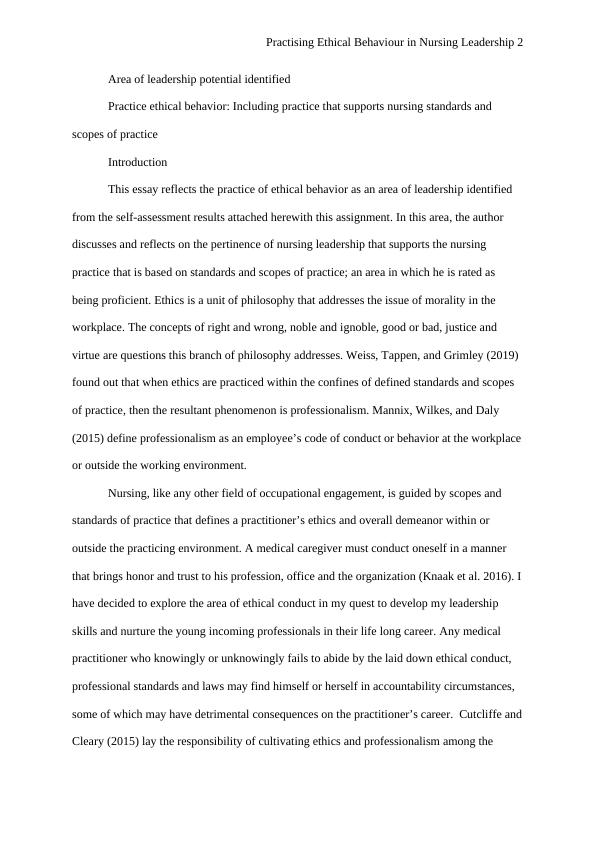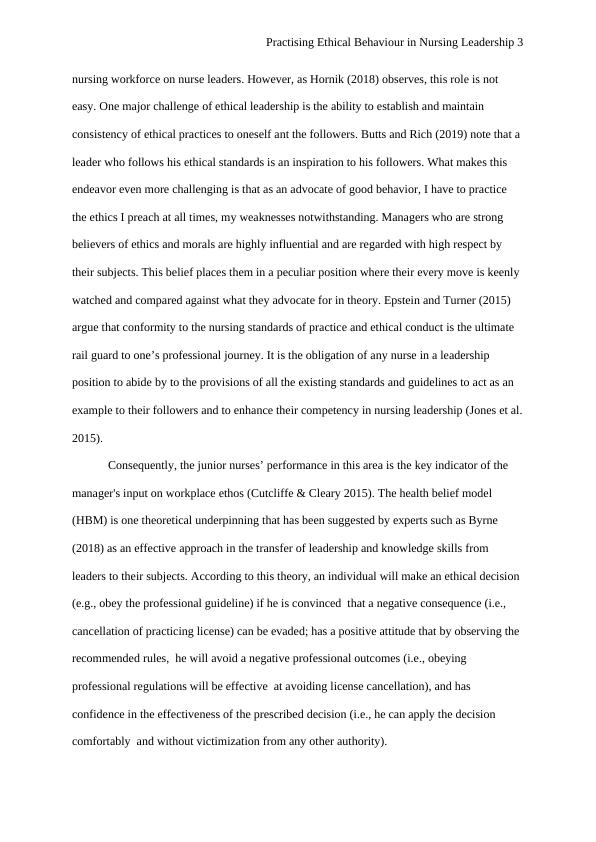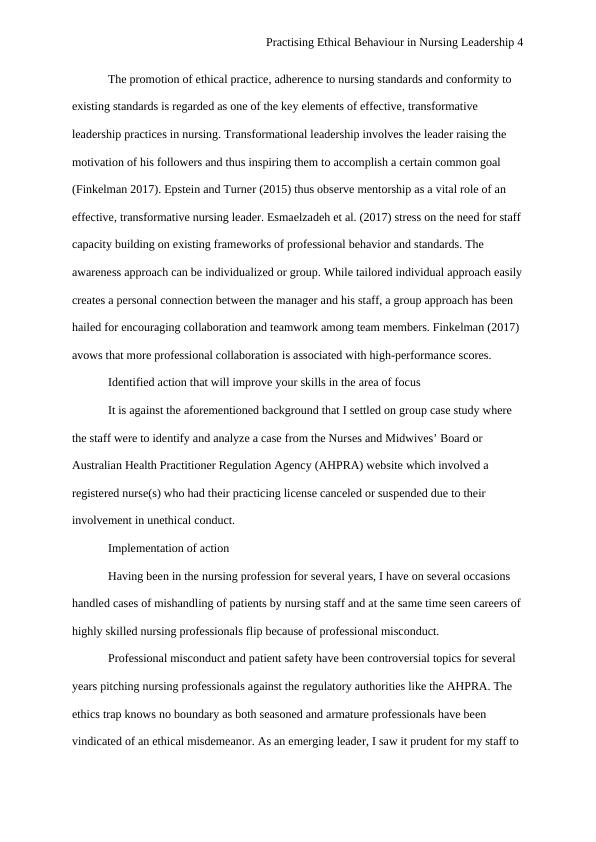Practising Ethical Behaviour in Nursing Leadership
Promote professional development of staff in the nursing field as a leadership potential
11 Pages3469 Words61 Views
Added on 2023-06-14
About This Document
This essay reflects the practice of ethical behavior as an area of leadership identified from the self-assessment results attached herewith this assignment. In this area, the author discusses and reflects on the pertinence of nursing leadership that supports the nursing practice that is based on standards and scopes of practice.
Practising Ethical Behaviour in Nursing Leadership
Promote professional development of staff in the nursing field as a leadership potential
Added on 2023-06-14
ShareRelated Documents
Practising Ethical Behaviour in Nursing Leadership 1
PRACTISING ETHICAL BEHAVIOUR IN NURSING LEADERSHIP
by [Name]
Course:
Tutor:
Institution
City
Date
PRACTISING ETHICAL BEHAVIOUR IN NURSING LEADERSHIP
by [Name]
Course:
Tutor:
Institution
City
Date

Practising Ethical Behaviour in Nursing Leadership 2
Area of leadership potential identified
Practice ethical behavior: Including practice that supports nursing standards and
scopes of practice
Introduction
This essay reflects the practice of ethical behavior as an area of leadership identified
from the self-assessment results attached herewith this assignment. In this area, the author
discusses and reflects on the pertinence of nursing leadership that supports the nursing
practice that is based on standards and scopes of practice; an area in which he is rated as
being proficient. Ethics is a unit of philosophy that addresses the issue of morality in the
workplace. The concepts of right and wrong, noble and ignoble, good or bad, justice and
virtue are questions this branch of philosophy addresses. Weiss, Tappen, and Grimley (2019)
found out that when ethics are practiced within the confines of defined standards and scopes
of practice, then the resultant phenomenon is professionalism. Mannix, Wilkes, and Daly
(2015) define professionalism as an employee’s code of conduct or behavior at the workplace
or outside the working environment.
Nursing, like any other field of occupational engagement, is guided by scopes and
standards of practice that defines a practitioner’s ethics and overall demeanor within or
outside the practicing environment. A medical caregiver must conduct oneself in a manner
that brings honor and trust to his profession, office and the organization (Knaak et al. 2016). I
have decided to explore the area of ethical conduct in my quest to develop my leadership
skills and nurture the young incoming professionals in their life long career. Any medical
practitioner who knowingly or unknowingly fails to abide by the laid down ethical conduct,
professional standards and laws may find himself or herself in accountability circumstances,
some of which may have detrimental consequences on the practitioner’s career. Cutcliffe and
Cleary (2015) lay the responsibility of cultivating ethics and professionalism among the
Area of leadership potential identified
Practice ethical behavior: Including practice that supports nursing standards and
scopes of practice
Introduction
This essay reflects the practice of ethical behavior as an area of leadership identified
from the self-assessment results attached herewith this assignment. In this area, the author
discusses and reflects on the pertinence of nursing leadership that supports the nursing
practice that is based on standards and scopes of practice; an area in which he is rated as
being proficient. Ethics is a unit of philosophy that addresses the issue of morality in the
workplace. The concepts of right and wrong, noble and ignoble, good or bad, justice and
virtue are questions this branch of philosophy addresses. Weiss, Tappen, and Grimley (2019)
found out that when ethics are practiced within the confines of defined standards and scopes
of practice, then the resultant phenomenon is professionalism. Mannix, Wilkes, and Daly
(2015) define professionalism as an employee’s code of conduct or behavior at the workplace
or outside the working environment.
Nursing, like any other field of occupational engagement, is guided by scopes and
standards of practice that defines a practitioner’s ethics and overall demeanor within or
outside the practicing environment. A medical caregiver must conduct oneself in a manner
that brings honor and trust to his profession, office and the organization (Knaak et al. 2016). I
have decided to explore the area of ethical conduct in my quest to develop my leadership
skills and nurture the young incoming professionals in their life long career. Any medical
practitioner who knowingly or unknowingly fails to abide by the laid down ethical conduct,
professional standards and laws may find himself or herself in accountability circumstances,
some of which may have detrimental consequences on the practitioner’s career. Cutcliffe and
Cleary (2015) lay the responsibility of cultivating ethics and professionalism among the

Practising Ethical Behaviour in Nursing Leadership 3
nursing workforce on nurse leaders. However, as Hornik (2018) observes, this role is not
easy. One major challenge of ethical leadership is the ability to establish and maintain
consistency of ethical practices to oneself ant the followers. Butts and Rich (2019) note that a
leader who follows his ethical standards is an inspiration to his followers. What makes this
endeavor even more challenging is that as an advocate of good behavior, I have to practice
the ethics I preach at all times, my weaknesses notwithstanding. Managers who are strong
believers of ethics and morals are highly influential and are regarded with high respect by
their subjects. This belief places them in a peculiar position where their every move is keenly
watched and compared against what they advocate for in theory. Epstein and Turner (2015)
argue that conformity to the nursing standards of practice and ethical conduct is the ultimate
rail guard to one’s professional journey. It is the obligation of any nurse in a leadership
position to abide by to the provisions of all the existing standards and guidelines to act as an
example to their followers and to enhance their competency in nursing leadership (Jones et al.
2015).
Consequently, the junior nurses’ performance in this area is the key indicator of the
manager's input on workplace ethos (Cutcliffe & Cleary 2015). The health belief model
(HBM) is one theoretical underpinning that has been suggested by experts such as Byrne
(2018) as an effective approach in the transfer of leadership and knowledge skills from
leaders to their subjects. According to this theory, an individual will make an ethical decision
(e.g., obey the professional guideline) if he is convinced that a negative consequence (i.e.,
cancellation of practicing license) can be evaded; has a positive attitude that by observing the
recommended rules, he will avoid a negative professional outcomes (i.e., obeying
professional regulations will be effective at avoiding license cancellation), and has
confidence in the effectiveness of the prescribed decision (i.e., he can apply the decision
comfortably and without victimization from any other authority).
nursing workforce on nurse leaders. However, as Hornik (2018) observes, this role is not
easy. One major challenge of ethical leadership is the ability to establish and maintain
consistency of ethical practices to oneself ant the followers. Butts and Rich (2019) note that a
leader who follows his ethical standards is an inspiration to his followers. What makes this
endeavor even more challenging is that as an advocate of good behavior, I have to practice
the ethics I preach at all times, my weaknesses notwithstanding. Managers who are strong
believers of ethics and morals are highly influential and are regarded with high respect by
their subjects. This belief places them in a peculiar position where their every move is keenly
watched and compared against what they advocate for in theory. Epstein and Turner (2015)
argue that conformity to the nursing standards of practice and ethical conduct is the ultimate
rail guard to one’s professional journey. It is the obligation of any nurse in a leadership
position to abide by to the provisions of all the existing standards and guidelines to act as an
example to their followers and to enhance their competency in nursing leadership (Jones et al.
2015).
Consequently, the junior nurses’ performance in this area is the key indicator of the
manager's input on workplace ethos (Cutcliffe & Cleary 2015). The health belief model
(HBM) is one theoretical underpinning that has been suggested by experts such as Byrne
(2018) as an effective approach in the transfer of leadership and knowledge skills from
leaders to their subjects. According to this theory, an individual will make an ethical decision
(e.g., obey the professional guideline) if he is convinced that a negative consequence (i.e.,
cancellation of practicing license) can be evaded; has a positive attitude that by observing the
recommended rules, he will avoid a negative professional outcomes (i.e., obeying
professional regulations will be effective at avoiding license cancellation), and has
confidence in the effectiveness of the prescribed decision (i.e., he can apply the decision
comfortably and without victimization from any other authority).

Practising Ethical Behaviour in Nursing Leadership 4
The promotion of ethical practice, adherence to nursing standards and conformity to
existing standards is regarded as one of the key elements of effective, transformative
leadership practices in nursing. Transformational leadership involves the leader raising the
motivation of his followers and thus inspiring them to accomplish a certain common goal
(Finkelman 2017). Epstein and Turner (2015) thus observe mentorship as a vital role of an
effective, transformative nursing leader. Esmaelzadeh et al. (2017) stress on the need for staff
capacity building on existing frameworks of professional behavior and standards. The
awareness approach can be individualized or group. While tailored individual approach easily
creates a personal connection between the manager and his staff, a group approach has been
hailed for encouraging collaboration and teamwork among team members. Finkelman (2017)
avows that more professional collaboration is associated with high-performance scores.
Identified action that will improve your skills in the area of focus
It is against the aforementioned background that I settled on group case study where
the staff were to identify and analyze a case from the Nurses and Midwives’ Board or
Australian Health Practitioner Regulation Agency (AHPRA) website which involved a
registered nurse(s) who had their practicing license canceled or suspended due to their
involvement in unethical conduct.
Implementation of action
Having been in the nursing profession for several years, I have on several occasions
handled cases of mishandling of patients by nursing staff and at the same time seen careers of
highly skilled nursing professionals flip because of professional misconduct.
Professional misconduct and patient safety have been controversial topics for several
years pitching nursing professionals against the regulatory authorities like the AHPRA. The
ethics trap knows no boundary as both seasoned and armature professionals have been
vindicated of an ethical misdemeanor. As an emerging leader, I saw it prudent for my staff to
The promotion of ethical practice, adherence to nursing standards and conformity to
existing standards is regarded as one of the key elements of effective, transformative
leadership practices in nursing. Transformational leadership involves the leader raising the
motivation of his followers and thus inspiring them to accomplish a certain common goal
(Finkelman 2017). Epstein and Turner (2015) thus observe mentorship as a vital role of an
effective, transformative nursing leader. Esmaelzadeh et al. (2017) stress on the need for staff
capacity building on existing frameworks of professional behavior and standards. The
awareness approach can be individualized or group. While tailored individual approach easily
creates a personal connection between the manager and his staff, a group approach has been
hailed for encouraging collaboration and teamwork among team members. Finkelman (2017)
avows that more professional collaboration is associated with high-performance scores.
Identified action that will improve your skills in the area of focus
It is against the aforementioned background that I settled on group case study where
the staff were to identify and analyze a case from the Nurses and Midwives’ Board or
Australian Health Practitioner Regulation Agency (AHPRA) website which involved a
registered nurse(s) who had their practicing license canceled or suspended due to their
involvement in unethical conduct.
Implementation of action
Having been in the nursing profession for several years, I have on several occasions
handled cases of mishandling of patients by nursing staff and at the same time seen careers of
highly skilled nursing professionals flip because of professional misconduct.
Professional misconduct and patient safety have been controversial topics for several
years pitching nursing professionals against the regulatory authorities like the AHPRA. The
ethics trap knows no boundary as both seasoned and armature professionals have been
vindicated of an ethical misdemeanor. As an emerging leader, I saw it prudent for my staff to

End of preview
Want to access all the pages? Upload your documents or become a member.
Related Documents
Nursinglg...
|10
|3711
|61
Professionalism in Nursinglg...
|6
|900
|200
Student Ethics in Personal Lifelg...
|5
|722
|38
(DOC) Learning and Leadership: ESSAYlg...
|9
|2288
|32
My Nursing Philosophylg...
|5
|1200
|59
Ethical Behaviour and Professional conduct in Business : Case Studylg...
|8
|2356
|110
